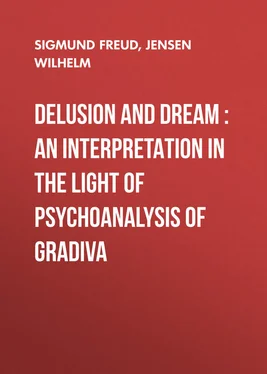Wilhelm Jensen - Delusion and Dream - an Interpretation in the Light of Psychoanalysis of Gradiva
Здесь есть возможность читать онлайн «Wilhelm Jensen - Delusion and Dream - an Interpretation in the Light of Psychoanalysis of Gradiva» — ознакомительный отрывок электронной книги совершенно бесплатно, а после прочтения отрывка купить полную версию. В некоторых случаях можно слушать аудио, скачать через торрент в формате fb2 и присутствует краткое содержание. Жанр: foreign_antique, foreign_prose, на английском языке. Описание произведения, (предисловие) а так же отзывы посетителей доступны на портале библиотеки ЛибКат.
- Название:Delusion and Dream : an Interpretation in the Light of Psychoanalysis of Gradiva
- Автор:
- Жанр:
- Год:неизвестен
- ISBN:нет данных
- Рейтинг книги:4 / 5. Голосов: 1
-
Избранное:Добавить в избранное
- Отзывы:
-
Ваша оценка:
- 80
- 1
- 2
- 3
- 4
- 5
Delusion and Dream : an Interpretation in the Light of Psychoanalysis of Gradiva: краткое содержание, описание и аннотация
Предлагаем к чтению аннотацию, описание, краткое содержание или предисловие (зависит от того, что написал сам автор книги «Delusion and Dream : an Interpretation in the Light of Psychoanalysis of Gradiva»). Если вы не нашли необходимую информацию о книге — напишите в комментариях, мы постараемся отыскать её.
Delusion and Dream : an Interpretation in the Light of Psychoanalysis of Gradiva — читать онлайн ознакомительный отрывок
Ниже представлен текст книги, разбитый по страницам. Система сохранения места последней прочитанной страницы, позволяет с удобством читать онлайн бесплатно книгу «Delusion and Dream : an Interpretation in the Light of Psychoanalysis of Gradiva», без необходимости каждый раз заново искать на чём Вы остановились. Поставьте закладку, и сможете в любой момент перейти на страницу, на которой закончили чтение.
Интервал:
Закладка:
But that was an idea which developed more upon reflection. Norbert gave himself up for a time to this occupation, yet it was not long before the project of a spring journey assumed definite shape. This he carried out that very day, packed a light valise, and before he went south by the night express, cast at nightfall another regretful departing glance on Gradiva, who, steeped in the last rays of the sun, seemed to step out with more buoyancy than ever over the invisible stepping-stones beneath her feet. Even if the impulse for travel had originated in a nameless feeling, further reflection had, however, granted, as a matter of course, that it must serve a scientific purpose. It had occurred to him that he had neglected to inform himself with accuracy about some important archæological questions in connection with some statues in Rome and, without stopping on the way, he made the journey of a day and a half thither.
Not very many personally experience the beauty of going from Germany to Italy in the spring when one is young, wealthy and independent, for even those endowed with the three latter requirements are not always accessible to such a feeling for beauty, especially if they (and alas they form the majority) are in couples on the days or weeks after a wedding, for such allow nothing to pass without an extraordinary delight, which is expressed in numerous superlatives; and finally they bring back home, as profit, only what they would have discovered, felt or enjoyed exactly as much by staying there. In the spring such dualists usually swarm over the Alpine passes in exactly opposite direction to the birds of passage. During the whole journey they billed and cooed around Norbert as if they were in a rolling dove-cot, and for the first time in his life he was compelled to observe his fellow beings more closely with eye and ear. Although, from their speech, they were all German country people, his racial identity with them awoke in him no feeling of pride, but rather the opposite one, that he had done reasonably well to bother as little as possible with the homo sapiens of Linnæan classification, especially in connection with the feminine half of this species; for the first time he saw also, in his immediate vicinity, people brought together by the mating impulse without his being able to understand what had been the mutual cause. It remained incomprehensible to him why the women had chosen these men, and still more perplexing why the choice of the men had fallen upon these women. Every time he raised his eyes, his glance had to fall on the face of some one of them and it found none which charmed the eye by outer attraction or possessed indication of intellect or good nature. To be sure, he lacked a standard for measuring, for of course one could not compare the women of to-day with the sublime beauty of the old works of art, yet he had a dark suspicion that he was not to blame for this unkind view, but that in all expressions there was something lacking which ordinary life was in duty bound to offer. So he reflected for many hours on the strange impulses of human beings, and came to the conclusion that of all their follies, marriage, at any rate, took the prize as the greatest and most incomprehensible one, and the senseless wedding trips to Italy somehow capped the climax of this buffoonery.
Again, however, he was reminded of the canary that he had left behind in captivity, for he also sat here in a cage, cooped in by the faces of young bridal couples which were as rapturous as vapid, past which his glance could only occasionally stray through the window. Therefore it can be easily explained that the things passing outside before his eyes made other impressions on him than when he had seen them some years before. The olive foliage had more of a silver sheen; the solitary, towering cypresses and pines here and there were delineated with more beautiful and more distinctive outlines; the places situated on the mountain heights seemed to him more charming, as if each one, in a manner, were an individual with different expression; and Trasimene Lake seemed to him of a soft blue such as he had never noticed in any surface of water. He had a feeling that a Nature unknown to him was surrounding the railway tracks, as if he must have passed through these places before in continual twilight, or during a grey rainfall, and was now seeing them for the first time in their golden abundance of colour. A few times he surprised himself in a desire, formerly unknown to him, to alight and seek afoot the way to this or that place because it looked to him as if it might be concealing something peculiar or mysterious. Yet he did not allow himself to be misled by such unreasonable impulses, but the “diretissimo” took him directly to Rome where, already, before the entrance into the station, the ancient world with the ruins of the temple of Minerva Medica received him. When he had finally freed himself from his cage filled with “inseparables,” he immediately secured accommodations in a hotel well known to him, in order to look about from there, without excessive haste, for a private house satisfactory to him.
Such a one he had not yet found in the course of the next day, but returned to his “albergo” again in the evening and went to sleep rather exhausted by the unaccustomed Italian air, the strong sun, much wandering about and the noise of the streets. Soon consciousness began to fade, but just as he was about to fall asleep he was again awakened, for his room was connected with the adjoining one by a door concealed only by a wardrobe, and into this came two guests, who had taken possession of it that morning. From the voices which sounded through the thin partition, they were a man and a woman who unmistakably belonged to that class of German spring birds of passage with whom he had yesterday journeyed hither from Florence. Their frame of mind seemed to give decidedly favourable testimony concerning the hotel cuisine, and it might be due to the good quality of a Castellin-romani wine that they exchanged ideas and feelings most distinctly and audibly in North German tongue:
“My only Augustus.”
“My sweet Gretchen.”
“Now again we have each other.”
“Yes, at last we are alone again.”
“Must we do more sight-seeing to-morrow?”
“At breakfast we shall look in Baedeker for what is still to be done.”
“My only Augustus, to me you are much more pleasing than Apollo Belvedere.”
“And I have often thought, my sweet Gretchen, that you are much more beautiful than the Capitoline Venus.”
“Is the volcano that we want to climb near here?”
“No, I think we’ll have to ride a few hours more in the train to get there.”
“If it should begin to belch flame just as we got to the middle, what would you do?”
“Then my only thought would be to save you, and I would take you in my arms – so.”
“Don’t scratch yourself on that pin!”
“I can think of nothing more beautiful than to shed my blood for you.”
“My only Augustus.”
“My sweet Gretchen.”
With that the conversation ceased, Norbert heard another ill-defined rustling and moving of chairs, then it became quiet and he fell back into a doze which transported him to Pompeii just as Vesuvius again began its eruption. A vivid throng of fleeing people caught him, and among them he saw Apollo Belvedere lift up the Capitoline Venus, take her away and place her safely upon some object in a dark shadow; it seemed to be a carriage or cart on which she was to be carried off, for a rattling sound was soon heard from that direction. This mythological occurrence did not amaze the young archæologist, but it struck him as remarkable that the two talked German, not Greek, to each other for, as they half regained their senses, he heard them say:
“My sweet Gretchen.”
Читать дальшеИнтервал:
Закладка:
Похожие книги на «Delusion and Dream : an Interpretation in the Light of Psychoanalysis of Gradiva»
Представляем Вашему вниманию похожие книги на «Delusion and Dream : an Interpretation in the Light of Psychoanalysis of Gradiva» списком для выбора. Мы отобрали схожую по названию и смыслу литературу в надежде предоставить читателям больше вариантов отыскать новые, интересные, ещё непрочитанные произведения.
Обсуждение, отзывы о книге «Delusion and Dream : an Interpretation in the Light of Psychoanalysis of Gradiva» и просто собственные мнения читателей. Оставьте ваши комментарии, напишите, что Вы думаете о произведении, его смысле или главных героях. Укажите что конкретно понравилось, а что нет, и почему Вы так считаете.












